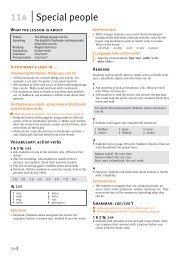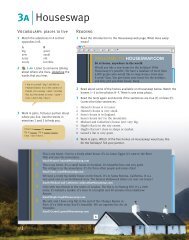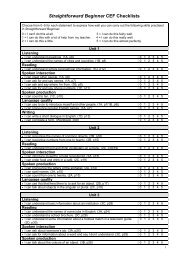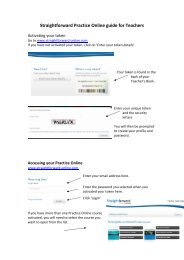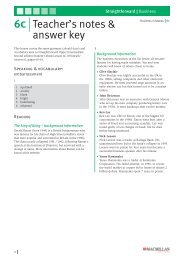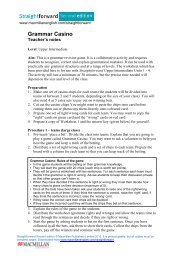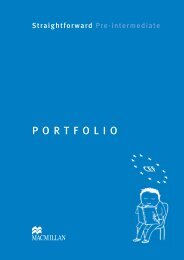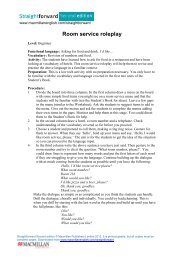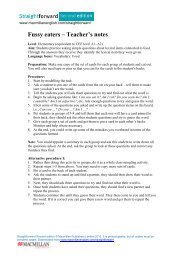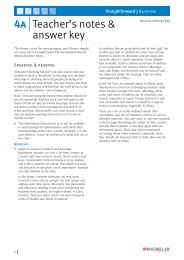Student's Book 18.90MB - Straightforward
Student's Book 18.90MB - Straightforward
Student's Book 18.90MB - Straightforward
Create successful ePaper yourself
Turn your PDF publications into a flip-book with our unique Google optimized e-Paper software.
9b SquattersVocabulary & speaking: describing homes1 Work in pairs. Discuss which type of home you would prefer in each ofthe pairs. Money is no object.• A detached house in the country or a large town-centre flat.• A caravan by the sea or a log cabin in the mountains.• A brand new flat overlooking a motorway or a 60-year-old flat in needof renovation and overlooking a park.• A house with no running water or one with neither gas nor electricity.2 Choose the correct words to complete the sentences. Use a dictionaryif necessary.4 You are going to do a roleplay in pairs,A and B.Student AYou saw an advertisement for the housebelow and have come to view it. Expressyour doubts to the owner.Student BYou are the owner of the house belowand are showing it to a prospectivebuyer. Respond to his/her doubts,highlighting its positive aspects.1 This newly- / freshly-built house is comfortably / conveniently locatednear the town centre.2 The building is in poor condition / state and in urgent need ofrepair / reform.3 It’s a lovely old straw / thatched cottage, full of antique / elderlyfurniture.4 The house is very broken-down / run-down and the gardencompletely grown-up / overgrown.5 It’s a warm and cosy / draughty little flat, and very tastily / tastefullydecorated.6 This nineteenth-century period / history house would suit the FAQ /DIY enthusiast.7 The family of six live in cramped / close conditions in a brightly lit /gloomy one-bedroomed flat with no electricity.8 It’s weakly / poorly furnished – the chairs are rickety / sickly andlikely to collapse and the carpets are threadbare / trodden.3 Work in pairs. Answer the questions.• Which of the sentences in exercise 2 give a positive (P) and which anegative (N) description?• How would you describe yourown home?5 Change roles and do the roleplay onpage 155.Listening1 Work in pairs. Read the dictionarydefinition of squatter and discuss thequestions.squatter /ˈskwɒtə(r)/ nounsomeone who lives in a place withoutpermission and without paying the owner• What type of people do you think squatand why?• How do you think you might react ifsquatters came to live near you?88
9c A place in the sunSpeaking1 During a Caribbean cruise you have one full day on thesmall island of Tobago. Look at the list of activities onpage 152 and choose four which interest you.2 Work in pairs. Explain your choices to each other andagree on three that you will do together.3 Explain your choices to another pair of students andagree on two that you will all do together.Compare your choices with the rest of the class.Reading1 Work in pairs. Discuss the questions.• The article speaks of two Caribbean hotels which take‘environmentally friendly measures’. What might thesemeasures consist of?• It also advises tourists to ‘help support the localeconomy’. How might they do this?2 Read the article and compare your ideas in exercise 1.3 Match the phrases 1–9 to the sections A–C of thearticle in which they are mentioned.1 trying to pay less for something2 attracting celebrities3 avoiding other holidaymakers4 an appeal for parents to educate their children5 the benefits of restricting size (two sections)6 giving away unwanted cups and plates7 a prohibition8 clearing up rubbish9 a carefully thought-out restoration4 Work in pairs. Discuss the questions.• In what ways did your last holiday benefit and/or harmthe environment and the local culture?• These items are all used at the Blue Haven Hotel. Howwidespread is their use in your country?• solar heating• biodegradable detergents• energy-saving light bulbs• organically-grown produceGrammar: inversionNot only will you get under the skin of the island, butyou can also ensure your money goes …Inversion of the subject and auxiliary verb isrequired when certain adverbials are placed at thebeginning of a sentence for emphasis.Never before had he seen anything so beautiful.Only now are the effects becoming apparent.On no account must exhibits be touched.Do, does or did is inserted where an auxiliary verb(or the verb to be) is not present.Rarely do you find a coin of this age in such goodcondition.Not until/Only when she got home did she realizewhat had happened.See Language Reference page 941 Rewrite the following sentences beginning with thewords in brackets.1 There isn’t a city anywhere in the world with as manybeautiful monuments as Rome. (Nowhere)1 Nowhere in the world is there a city with as manybeautiful monuments as Rome.2 You very rarely come across anyone nowadays whohasn’t been abroad. (Very rarely)3 You can only really learn a language by living in acountry where it is spoken. (Only by)4 Tourists should not be allowed to visit the Antarcticunder any circumstances. (Under no circumstances)5 You won’t truly know what good food is until you’vetried French cuisine. (Not until)6 I hated visiting monuments as a child and I couldn’tstand going into museums. (Not only)7 I’ve only recently started going on holiday without myparents. (Only recently)8 I’ll never go back to that place I went to last year onholiday! (Never again)2 Work in pairs. Discuss the sentences in exercise 1. Howtrue are they for you?3 Imagine you have just spent a disappointing fortnightin a Caribbean ecotourism hotel. Write five sentencescomplaining about different aspects of your stay. Begineach sentence with one of the following:At no time, Not once, Only when, Not until, Hardly,No sooner, Not only, Nowhere, Never againCompare your sentences with your partner’s.90
Experimental travel 9dSpeecH feature: vague languageA number of expressions are used in conversation toshow vagueness or a lack of precision. Here are someexamples from the listening.I sort of became aware of every sound.I could smell every coffee or sandwich or whatever.There was loads of greenery, you know, trees andgrass and stuff like that.1 Complete the vague expressions from the first extractof the recording with the words in the box.anything everything somethingthing kind all so like1 I think wearing it really did of sharpen myother senses.2 We did all the sights and – the cathedral, the citywalls, the historic buildings and on.3 What about things like eating and washing andthat?4 Did you go into any museums or ?5 Paul took me into an exhibition by some local sculptor– Anna Kirby, or , I think her name was.6 It was all modern stuff, from local stone – lots of curvesand holes and that sort of .2 Check your answers in audioscript 3.3 on page 160.Underline further examples of vague language inextracts 2 and 3 in audioscripts 3.4 and 3.5.3 Work in small groups. Imagine you have each justreturned from the experimental travel experienceyou ranked number 1 in Speaking exercise 2. Telleach other about your experience using some of theexpressions in exercise 2.Vocabulary: adjectives formed withparticlesA number of adjectives are formed using particlessuch as in, out, on, off, up, down, over, under, away.These may be written with or without a hyphen oras one word. The following examples are all from therecording:head-on collision run-down estates built-up areaworn out fed up cheesed off faraway placeoncoming lorry overnight train1 Complete the questions with the adjectives in the box.sit-down outdoor uphill off-the-pegout-of-the-way online comfortably offup-to-date outspoken indoor out-of-town1 Is learning English an struggle for you or arelatively easy task?2 Do you prefer superstores or town centre shops?3 Would you rather have a holiday in an place or acrowded resort?4 Do you do more or activities in yourfree time?5 Are you more a supporter or an critic of yourgovernment?6 For weddings and other celebrations do you prefer ameal or a finger-food buffet?7 Are you more likely to buy an suit or amade-to-measure one?8 Which do you do more – use banking servicesor visit your local branch?9 Do you keep with the latest celebrity gossip ordoes it bore you?10 Are you hard up or at the moment?2 Work in pairs. For each question in exercise 1,underline the alternative which you think your partneris most likely to choose in answer to the question.3 Check and discuss your ideas for exercise 2 with yourpartner. How accurate were they?93
9 Language referenceGrammarModal verbs: will, would, shall1 Use will and would:• to talk about present and past habits.I’ll often have just a biscuit for breakfast.She would always cook fish on Fridays.• to talk about typical annoying behaviour. In speech themodal verb is stressed.She will keep sniffing all the time.He would be late, wouldn’t he? He always does this.• to make requests.Will/Would you make me a cup of tea, please?• to express willingness to do something.If you’ll put the dishes away, I’ll do the ironing.If you’ll/would take a seat, I’ll tell her you’re here.• to express refusal to do something in the present andthe past.He won’t do anything I ask him to.She just wouldn’t listen to me.2 Use will to express:• predictions.I think she’ll pass – she’s been studying very hard.There’s every/a good/a fair/a slight/little/no chance (that)they’ll lose tomorrow.• intentions.I’ll give him a ring later.• assumptions about the present.They won’t have got there yet – they’ll still be on themotorway somewhere.• future facts.It’s Sam’s birthday tomorrow – he’ll be eighteen.See also Futures Unit 10.3 Use would:• to express future from a past perspective.As a child he dreamed he would one day be famous.• to talk about imaginary situations.You’d look smarter in a suit.• to give advice.I wouldn’t eat it if I were you – it’s very bitter.I’d put a coat on – it’s quite chilly outside.4 Use shall to make:• offers.Shall I pick you up from the station?• suggestions.Shall we try that new Indian restaurant tonight?• requests for instructions and advice.Here you are. Where shall I put it?I’m so nervous – what shall I say to her?• arrangements.What time shall we meet?InversionThe position of the subject and auxiliary verb is inverted(=reversed) when certain negative or restrictive adverbialsare placed at the beginning of a sentence for emphasis.She would never feel able to trust him again.Never again would she feel able to trust him.If neither an auxiliary verb nor the verb to be is present, do,does or did is inserted.He realized only then the full extent of the damage.Only then did he realize the full extent of the damage.Inversion occurs mainly, though not exclusively, in writtenEnglish or more formal speech. It is used:• after certain phrases with not.Not since their wedding had he told Diana he loved her.Not only did she have to pay a fine, but she also lost herdriving licence.Also: not until, not once, not for one minute• after certain phrases with only.Only occasionally do they fail to agree.Only when we know she is safe will we agree to paythe ransom.Also: only now, only then, only recently, only later, only veryrarely, only by -ing, only in the last few days• after certain phrases with no.At no time did we consider giving up.Also: nowhere (else), under no circumstances, on no account,(in) no way• after the frequency adverbs rarely, seldom, hardly ever,never (before/again).Rarely have I seen such a talented young musician.Hardly ever do we have time for a cooked lunch.• with hardly … when … and no sooner … than …Hardly had he started in the job when he fell ill.No sooner had she unpacked her bags than thephone rang.94
Language reference 9Word listVague languageand all thatand everythingand so onand stuff like thatand that sort of thingI meankind oflikeor anythingor somethingor whateversort ofyou knowDescribing homesantique adj * /ænˈtiːk/conveniently located /kənˌviːniəntliləʊˈkeɪtɪd/cosy adj */ˈkəʊzi/DIY enthusiast n C /ˌdiː aɪ ˈwaɪɪnˈθjuːziæst/draughty adj /ˈdrɑːfti/gloomy adj * /ˈgluːmi/in cramped /ɪn ˈkræmptconditions kənˌdɪʃ(ə)nz/in poor condition /ɪn ˈpɔː(r), ˈpʊə(r)kənˌdɪʃ(ə)n/in urgent need of /ɪn ˈɜː(r)dʒ(ə)ntrepairniːd əv rɪˌpeə(r)/log cabin n C /ˌlɒg ˈkæbɪn/mobile home n C /ˌməʊbaɪl ˈhəʊm/newly built /ˌnjuːli ˈbɪlt/overgrown adj /ˌəʊvə(r)ˈgrəʊn/period adj /ˈpɪəriəd/poorly furnished /ˌpɔː(r)li, pʊə(r)liˈfɜː(r)nɪʃt/rickety adj /ˈrɪkəti/run-down adj /ˌrʌn ˈdaʊn/running water n U /ˌrʌnɪŋ ˈwɔːtə(r)/tastefully decorated /ˌteɪstfəliˈdekəreɪtɪd/thatched adj /θætʃt/threadbare adj /ˈθredˌbeə(r)/Adjectives formed withparticlesbuilt-up adjcheesed off adjcomfortably off adjfaraway adjhard up adjhead-on adj/ˈbɪlt ˌʌp//ˌtʃiːzd ˈɒf//ˌkʌmftəbli ˈɒf//ˌfɑːrəˈweɪ//ˌhɑː(r)d ˈʌp//ˈhed ˌɒn/indoor adj * /ˈɪndɔː(r)/made-to-measure /ˌmeɪd tə ˈmeʒə(r)/off-the-peg adj /ˌɒf ðə ˈpeg/oncoming adj /ˈɒnˌkʌmɪŋ/online adj ** /ˈɒnlaɪn/outdoor adj * /ˌaʊtˈdɔː(r)/out-of-the-way adj /ˌaut əv ðə ˈweɪ/out-of-town adj /ˌaʊt əv ˈtaʊn/outspoken adj * /ˌaʊtˈspəʊkən/overnight adj * /ˌəʊvə(r)ˈnaɪt/sit-down meal /ˌsɪt daʊn ˈmiːl/uphill struggle /ˌʌphɪl ˈstrʌg(ə)l/up-to-date adj * /ˌʌp tə ˈdeɪt/worn out adj /ˌwɔː(r)n ˈaʊt/Other words & phrasesadjacent to /əˈdʒeɪs(ə)nt tuː/alienation n U /ˌeɪliəˈneɪʃ(ə)n/alleviate v/əˈliːvieɪt/amble v/ˈæmb(ə)l/ample adj * /ˈæmp(ə)l/at a stroke /ˌæt ə ˈstrəʊk/bandstand n C /ˈbæn(d)ˌstænd/biodegradable adj /ˌbaɪəʊdɪˈgreɪdəb(ə)l/blindfolded adj /ˈblaɪn(d)ˌfəʊldɪd/boast v */bəʊst/branch n *** /brɑːntʃ/breathtaking adj * /ˈbreθˌteɪkɪŋ/bring (sth) down v /ˌbrɪŋ ˈdaʊn/carry (sth) out v /ˌkæri ˈaʊt/choked adj /tʃəʊkt/coat of paint n C /ˌkəʊt əv ˈpeɪnt/confines n pl /ˈkɒnfaɪnz/coral reef n C /ˌkɒrəl ˈriːf/crisply uniformed /ˌkrɪspliˈjuːnɪfɔː(r)md/cruciform adj /ˈkruːsɪˌfɔː(r)m/crumbling adj /ˈkrʌmblɪŋ/dead end adj /ˌded ˈend/devour v/dɪˈvaʊə(r)/do (sth) up /ˌdʊ ˈʌp/dotted adj/ˈdɒtɪd/draw (sth) up /ˌdrɔː ˈʌp/drop by v/ˌdrɒp ˈbaɪ/dynamite v /ˈdaɪnəmaɪt/effluent n C /ˈefluənt/enlightening adj /ɪnˈlaɪt(ə)nɪŋ/evict v/ɪˈvɪkt/fenced off adj /ˌfenst ˈɒf/fidget v/ˈfɪdʒɪt/flirt v/flɜː(r)t/for the sake of /ˌfɔː(r) ðə ˈseɪk ɒv/get settled in /get ˌset(ə)ld ˈɪn/get to grips with /ˌget tʊ ˈgrɪps wɪð/go through the /gəʊ ˌθruː ðəcourtsˈkɔː(r)ts/greenery n U /ˈgrɪːnəri/haggle v/ˈhæg(ə)l/hairy adj * /ˈheəri/hands-on adj /ˌhændz ˈɒn/hassle n C * /ˈhæs(ə)l/haunt n C/hɔːnt/hinder v/ˈhɪndə(r)/horde n C/hɔː(r)d/house-hunting n U /ˈhaʊs ˌhʌntɪŋ/immaculate adj /ɪˈmækjʊlət/impeccably adv /ɪmˈpekəbli/instill v/ˌɪnˈstɪl/interchange n C /ˈɪntə(r)ˌtʃeɪndʒ/layabout n C /ˈleɪəˌbaʊt/listed building /ˌlɪstɪd ˈbɪldɪŋ/litany n C/ˈlɪtəni/lousy adj/ˈlaʊzi/low-rise adj /ˌləʊ ˈraɪz/lush adj */lʌʃ/marshland n U /ˈmɑː(r)ʃˌlænd/needlessly adv /ˈniːdləsli/on tap/ˌɒn ˈtæp/pier n C */pɪə(r)/pillow sham n C /pɪləʊ ˈʃæm/pinball n U /ˈpɪnˌbɔːl/property ladder n /ˈprɒpə(r)ti ˌlædə(r)/queue up for v /ˌkjuː ˈʌp fɔː(r)/refuse point blank /rɪˌfjuːz pɔɪntˈblæŋk/renowned for adj /rɪˈnaʊnd ˌfɔː(r)/rookie n C /ˈrʊki/rowdy adj/ˈraʊdi/safeguard v /ˈseɪfˌgɑː(r)d/scattered adj * /ˈskætə(r)d/scavenger hunt n C /ˈskævɪndʒə(r)ˌhʌnt/scrape n C /skreɪp/sewage n U /ˈsuːɪdʒ/snorkelling n U /ˈsnɔː(r)k(ə)lɪŋ/spell (sth) out /ˌspel ˈaʊt/sprawl n U /sprɔːl/squat v */skwɒt/squatter n /ˈskwɒtə(r)/squeeze v ** /skwiːz/steelpan band n C /ˌstiːlpæn ˈbænd/stunning adj * /ˈstʌnɪŋ/tactile adj/ˈtæktaɪl/take in the sights /ˌteɪk ɪn ðə ˈsaɪts/tiered adj/tɪə(r)d/turtle n C/ˈtɜː(r)t(ə)l/underpin v /ˌʌndə(r)ˈpɪn/untangle v /ʌnˈtæŋg(ə)l/well-trodden adj /ˌwel ˈtrɒd(ə)n/wetlands n pl /ˈwetlændz/while (sth) away v /ˌwaɪl əˈweɪ/wind v/waɪnd/95




